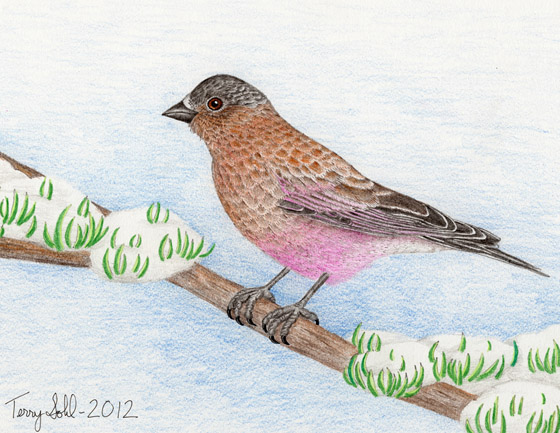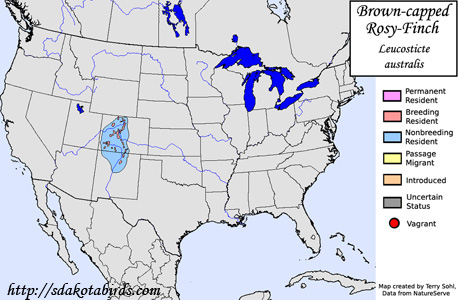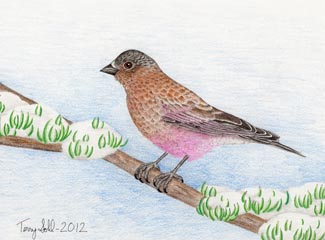| Length: 6.25 inches | Wingspan: 13 inches | Seasonality: Non-resident in South Dakota |
| ID Keys: Dark crown, brown breast and upperparts, pink underparts. Only Rosy-Finch without much gray on crown. | ||
 The
Brown-capped Rosy-Finch is only found in a very small home range, with most
birds found in high-elevation areas of Colorado. Small and local
populations can also be found in extreme southern Wyoming, and in northern
New Mexico. While Brown-capped Rosy-Finches are the most "southerly"
of the Rosy-Finches, the habitats they prefer are still very harsh and
inhospitable, typically barren tundra and frozen snowfields at high
elevation.
The
Brown-capped Rosy-Finch is only found in a very small home range, with most
birds found in high-elevation areas of Colorado. Small and local
populations can also be found in extreme southern Wyoming, and in northern
New Mexico. While Brown-capped Rosy-Finches are the most "southerly"
of the Rosy-Finches, the habitats they prefer are still very harsh and
inhospitable, typically barren tundra and frozen snowfields at high
elevation.
Habitat: Found in barren tundra, rocky slopes, and snowfields above timberline during the summer breeding season. In winter, they can be found in a variety of lower-elevation habitats, and can even be found in suburban settings.
Diet: Seeds are consumed year-round and make up a large part of the diet, especially in winter. The summer diet includes many insects and spiders. Other food items include fresh buds and leaves.
Behavior: Most foraging is done on the ground, with birds picking small insects and from high-elevation snowfields and tundra in the summer, and foraging ont he ground for seeds in the winter.
Nesting: The nest of Brown-capped Rosy-Finches is placed in a well-sheltered locations such as a crevice on a rocky cliff, in a cave or mine shaft, or occasionally in abandoned buildings above timberline. The female constructs the nest, using moss, grass, and other plant material. Both parents help to raise the young.
Song: Song is rarely heard, but is a slow weries of descending whistled notes. The call is a buzzy jeeew.
Migration: Migration of the Brown-capped Rosy-Finch is all altitudinal, with birds moving to lower elevations for the winter. The amount of downslope dispersal seems to be related to the severity of the winter.
Interactive eBird Map: Click to access an interactive map of Brown-capped Rosy-Finch sightings
Feeders: Will occasionally attend feeders for seeds in the winter, when the move from their higher-elevation summer breeding grounds.
Similar Species: Black Rosy-Finch, Gray-crowned Rosy-Finch
Conservation Status: The IUCN lists the Brown-capped Rosy-Finch as a species of "Least Concern". However, there have been indications of population declines in recent decades. The American Bird Conservancy lists the species as a "Declining Yellow List Species".
Further Information: 1) Cornell's All About Birds - Brown-capped Rosy-Finch
2) Audubon - Brown-capped Rosy-Finch
3) American Bird Conservancy - Brown-capped Rosy-Finch
Image Information: Colored pencil Drawing - Terry Sohl - February 2012
| Click below for a higher-resolution map |
 |
| South Dakota Status: Non-resident in South Dakota |
Additional Brown-capped Rosy-Finch Images

